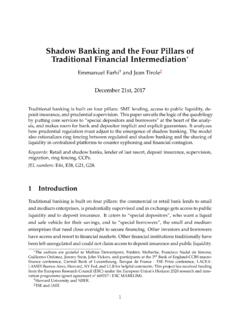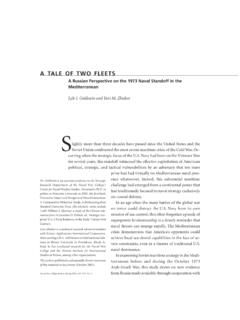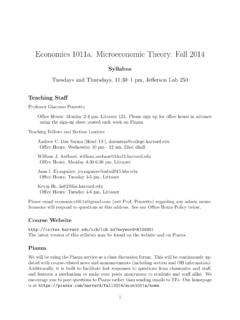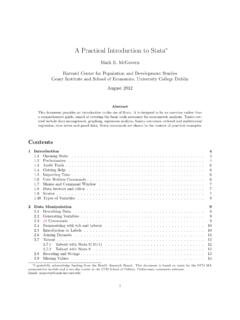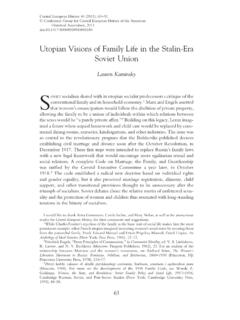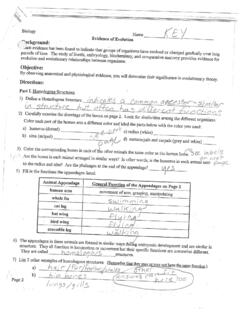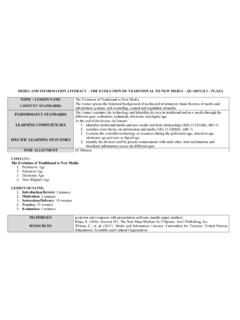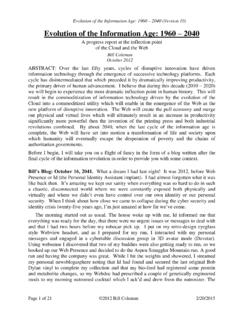Transcription of The Evolution of Common Law - Harvard University
1 43[Journal of Political Economy,2007, vol. 115, no. 1] 2007 by The University of Chicago. All rights reserved. 0022-3808/2007/11501-0002$ Evolution of Common LawNicola GennaioliUniversity of StockholmAndrei ShleiferHarvard UniversityWe present a model of lawmaking by appellate courts in which judgesinfluenced by policy preferences can distinguish precedents at somecost. We find a cost and a benefit of diversity of judicial views. Policy-motivated judges distort the law away from efficiency, but diversity ofjudicial views also fosters legal Evolution and increases the law s pre-cision.
2 We call our central finding the Cardozo theorem: even whenjudges are motivated by personal agendas, legal Evolution is, on av-erage, beneficial because it washes out judicial biases and renders thelaw more precise. Our paper provides a theoretical foundation for theevolutionary adaptability of Common a Common -law legal system, such as that of the United States andthe United Kingdom, many important laws are made not by legislaturesbut by appellate courts deciding specific cases and thus creating prec-edents. Judge-made law is dominant in commercial areas of law, suchas contract, property, and tort law.
3 Judge-made legal rules promote orundermine economic efficiency when the Coase (1960) theorem doesWe are grateful to Olivier Blanchard, Filipe Campante, Edward Glaeser, Claudia Goldin,Oliver Hart, Elhanan Helpman, Fausto Panunzi, Torsten Persson, Richard Posner, IliaRainer, Alan Schwartz, Kathryn Spier, David Stro mberg, an anonymous referee, the editorof thisJournal, and especially Louis Kaplow for helpful of political economynot apply. Yet compared to the vast body of research on legislative law-making, judicial lawmaking has been relatively neglected by this paper, we present a simple model of lawmaking that emphasizesthe role of judicial preferences.
4 Our model addresses both positive andnormative questions about the Evolution of judge-made law. Under whatcircumstances does legal Evolution occur? What form does it take? Is iton average beneficial? What is the relationship between polarization ofjudicial preferences, volatility of legal rules, and welfare? Does the lawultimately converge to efficiency?At least three areas of scholarship have tackled these issues. First, free-market philosophers such as Hayek (1960, 1973) and Leoni (1961)praised judge-made law for its role in preserving freedom.
5 To them,decentralized Evolution of law through primarily apolitical judicial de-cisions is vastly preferable to centralized yet arbitrary lawmaking by with these ideas, La Porta, Lopez-de-Silanes, Pop-Eleches, and Shleifer (2004) find a positive relationship in a cross sectionof countries between economic freedom and a proxy for recognitionof judicial decisions, as opposed to just legislation, as a source of , Demirguc-Kunt, and Levine (2003, 2005) argue further in theHayek tradition that judge-made law is more adaptable than suggest that such adaptability might be important for financialmarkets, and they find evidence that recognition of judge-made lawpredicts financial development and might account for the finding ofLa Porta, Lopez-de-Silanes, Shleifer, and Vishny (1998)
6 Of the superiordevelopment of financial markets in Common -law compared to the civil-law , the legal realist tradition in American jurisprudence, whichin contrast to the free-market philosophers emphasizes that judges makedecisions based on their political and other beliefs, nonetheless con-cludes that judge-made law evolves for the better ( , Llewellyn 1960,402; see also Holmes 1897; Cardozo 1921; Radin 1925; Frank 1930;Llewellyn 1951; Stone 1985; Posner 2005). Perhaps the most famousassessment of this evolutionary process is Judge Benjamin Cardozo s(1921, 177):The eccentricities of judges balance one another.
7 One judgelooks at problems from the point of view of history, anotherfrom that of philosophy, another from that of social utility, oneis a formalist, another a latitudinarian, one is timorous ofchange, another dissatisfied with the present; out of the attri-tion of diverse minds there is beaten something which has a1 Glaeser and Shleifer (2002) and Ponzetto and Fernandez (2006) explicitly comparelegal rules produced by judges and of Common law45constancy and uniformity and average value greater than itscomponent , the Evolution of Common -law rules and their convergence toefficiency have been taken up in law and economics.
8 In hisEconomicAnalysis of Law([1973] 2003), Posner hypothesizes that Common lawtends toward efficiency, largely on the basis of the argument that judgesmaximize efficiency. Cooter, Kornhauser, and Lane (1979) find thatdecision making by welfare-maximizing but imperfectly informed judgesimproves the law over time. Priest (1977) and Rubin (1977) furthersuggest that disputes involving inefficient legal rules are more likely tobe taken to court rather than settled, leading to the replacement ofsuch rules by better ones over time.
9 Cooter and Kornhauser (1980)formally show that the law tends to improve if inefficient rules are morelikely to be replaced than the efficient diverse strands of research do not share a Common frameworkfor studying the Evolution of judge-made legal rules and evaluating theirefficiency. In such a framework, there must be judges, these judges mustbe able to make decisions based on their preferences, and questionsabout the Evolution and the quality of law must still be possible toaddress. For even if judicial decisions are governed by ideologies andbiases rather than maximization of efficiency, the evolutionary processmay still improve the law.
10 When does legal Evolution warrant the op-timistic assessments of free-market philosophers, legal realists, and lawand economics scholars?To address these issues, we present a model in which precedents evolvethrough a series of decisions by appellate judges. Our model relies onthree assumptions. First, following the legal realists and a modelingstrategy of Gennaioli (2004), we assume that judges hold biases favoringdifferent types of disputants and that these biases vary across the pop-ulation of judges. Political scientists document the importance of judicialattitudes in shaping appellate rulings.



